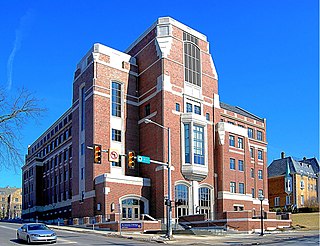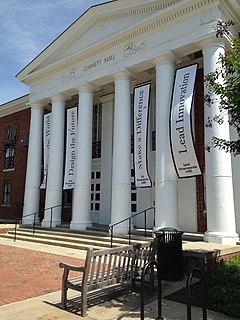
James Joseph Heckman is a Nobel Prize winning American economist who is currently at the University of Chicago, where he is The Henry Schultz Distinguished Service Professor in Economics and the College; Professor at the Harris Graduate School of Public Policy Studies; Director of the Center for the Economics of Human Development (CEHD); and Co-Director of Human Capital and Economic Opportunity (HCEO) Global Working Group. He is also Professor of Law at the Law School, a senior research fellow at the American Bar Foundation, and a research associate at the National Bureau of Economic Research. In 2000, Heckman shared the Nobel Memorial Prize in Economic Sciences with Daniel McFadden, for his pioneering work in econometrics and microeconomics. As of December 2020, according to RePEc, he is the second most influential economist in the world.

The Harvard Kennedy School is the public policy school of Harvard University in Cambridge, Massachusetts. The school offers master's degrees in public policy, public administration, and international development, four doctoral degrees, and many executive education programs. It conducts research in subjects relating to politics, government, international affairs, and economics. As of 2019, HKS had an endowment of $1.3bn.

The Princeton School of Public and International Affairs is a professional public policy school at Princeton University. The school provides an array of comprehensive coursework in the fields of international development, foreign policy, science and technology, and economics and finance through its undergraduate (AB) degrees, graduate Master of Public Affairs (MPA), Master of Public Policy (MPP), and PhD degrees. Since 2012, Cecilia Rouse has been dean of the Princeton School. The school is consistently ranked as one of the best institutions for the study of international relations and public affairs in the country and in the world. Foreign Policy ranks the Princeton School as No. 2 in the world for International Relations at the undergraduate and PhD levels, behind the Harvard Kennedy School.

The School of International Service (SIS) is American University's school of advanced international study, covering areas such as international politics, international communication, international development, international economics, peace and conflict resolution, global environmental politics, and U.S. foreign policy.

The Hubert H. Humphrey School of Public Affairs at the University of Minnesota is one of the United States' top-ranked professional public policy and planning schools. The school is noted for equipping students to play key roles in public life at the local, state, national, and global level and offers six distinctive master's degrees, a doctoral degree, and six certificate programs.

The School of International and Public Affairs at Columbia University (SIPA) is the international affairs and public policy school of Columbia University, a private Ivy League university located in Morningside Heights, Manhattan, New York City.

The Gerald R. Ford School of Public Policy, often referred to as the Ford School, is a leading public policy school at the University of Michigan. Founded in 1914 to offer training in municipal administration, in 1999 the school was named after former President Gerald Ford, who graduated from the University of Michigan in 1935. In the latest U.S. News & World Report rankings, the Ford School was ranked #1 in social policy, #1 in public policy analysis, #8 in environmental policy and management, and #3 in health policy and management.

Public policy schools are typically university programs which teach students policy analysis, policy studies, public policy, political economy, urban planning, public administration, public affairs, and public management. Public policy schools typically train students in two streams. The more practical stream treats the master's degree as a terminal degree, which trains students to work as policy analysts in governments, think tanks and consulting firms. A more theoretical stream aims to train students who are aiming to go on to complete doctoral studies, with the goal of becoming professors of public policy or researchers.
The Center for Middle Eastern Studies at the University of Chicago is a National Resource Center for the study of a region extending from Morocco in the West to Kazakhstan in the East. As a result, this Area Center covers some of the most important and controversial regions - including North Africa, the Middle East, and Central Asia. Prior to the Center's formation, scholars originally received funding administered by Title VI of the US Department of Defense's National Defense Education Act. The University of Chicago did not form its center until 1965, well after the administration of funding was moved to the US Department of Education by President John F. Kennedy. This area center consistently ranks in the highest tier of those dealing with Middle Eastern studies in the United States according to US Department of Education and external reviews. In the most recent competition for Department of Education's Title VI funds in 2014, the Center was awarded both NRC and FLAS grants, which support courses, extracurricular programs, educational outreach, and graduate student fellowships.
The Maryland School of Public Policy is one of 14 schools at the University of Maryland, College Park. The school is located inside the Capital Beltway and ranks 16th nationally for schools of public policy according to U.S. News & World Report (2012).

The McCourt School of Public Policy is one of ten constituent schools of Georgetown University. The McCourt School offers master's degrees in public policy, international development policy, policy management, data science for public policy, and policy leadership as well as administers several professional certificate programs and houses fifteen affiliated research centers. The McCourt School has twenty-one full-time faculty members, ten visiting faculty members, more than one-hundred adjunct faculty members and approximately 450 enrolled students across the various degree and executive education programs.

The Hertie School is a German private independent graduate school located in Berlin's Friedrichstraße. It has a right to confer doctoral degrees. Half of the students in the Hertie School come from abroad, and the working language is English.

The Frank Batten School of Leadership and Public Policy is one of the University of Virginia's graduate schools. The school offers classes and degree programs in Public Policy and Leadership. The school, established in 2007, is closely aligned with many of the University's schools, including the architecture, business, education, engineering, law, and medicine schools, as well as with programs in politics, economics, and applied ethics.

The University of Pittsburgh School of Social Work, one of the 13 schools and colleges within the University of Pittsburgh, is located in the Oakland section of Pittsburgh, Pennsylvania. Its offices are in the world-famous Cathedral of Learning, a forty-story, Gothic style edifice that is the signature building of the university.
The Pepperdine University School of Public Policy (SPP) is a Master of Public Policy (MPP) degree program, located in Malibu, California with summer classes offered in Washington, DC. It is one of four graduate schools at Pepperdine University. The MPP is customized with specializations in Applied Economic Policy, American Policy and Politics, International Relations and National Security, State and Local Policy, and Public Policy Dispute Resolution.

The Trachtenberg School of Public Policy and Public Administration is the graduate school of public policy and public administration in the Columbian College of Arts and Sciences of the George Washington University, in Washington, D.C. The Trachtenberg School is one of the most prestigious schools of public policy and public management in the United States.
York University Faculty of Health was founded in 2006. Led by Dean Paul McDonald, it is based in Toronto, Ontario, Canada and is part of York University's campus of 50,000 students.
The Ford Dorsey Master's in International Policy (MIP) at Stanford University is a two-year graduate program granting the Master of Arts degree. Housed within Stanford's Freeman Spogli Institute for International Studies, MIP is a multidisciplinary program dedicated to the study and analysis of international affairs. The current director of MIP is Francis Fukuyama, also the Olivier Nomellini Senior Fellow at the Freeman Spogli Institute for International Studies. Dr. Chonira Aturupane is the associate director of academic and student affairs.

The Willy Brandt School of Public Policy is a public institute for research and education in the field of public policy at the University of Erfurt. It was established in 2002, offering the first German study program leading to a Master of Public Policy (MPP) degree. The program has been accredited and reaccredited by ACQUIN. The working language is English. Until November 2009, the school was named Erfurt School of Public Policy (ESPP).















